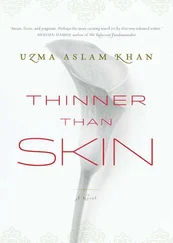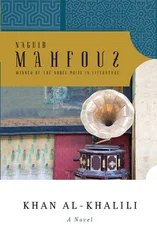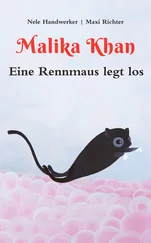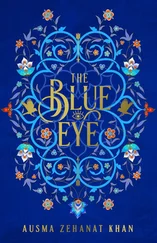She shifted in her seat, growing increasingly irritated with herself. There were fifteen minutes left. She glanced at the woman with the scraps in her bra and burst out laughing. Her matronly bosom was now barely a curve, and ribbony chits oozed out of her kurta like birthday streamers.
She thought: the American boy might undress Nini. What if she hated his touch? What if he had bad breath? What if he drooled? What if he hurt her? What if she hurt for the rest of her life?
What if she didn’t hurt, but loved it?
What if Dia was going completely mad?
Head Supervisor consulted her watch and, with what sounded like a last breath, declared that time was up. It hardly mattered: those who wanted to keep writing did.
Dia had written three words: Nose. Moon. Come.
Miserably ashamed, she handed over the test without even her name.
At the college gate, she walked past her car and driver and on to the street. The driver followed her. ‘I don’t need an escort. I’m sick of escorts!’ She whisked by, then turned back guiltily. He was only doing his job. His job was to drive her to college then drive her back. Drive her to the farm with two armed guards then back. Drive her to Nini’s, her relatives, the bazaar, mill, and back. His job was to confine her in a safe and mobile haven, between safe and immobile havens. His job was to keep her off the street, where men leered, sometimes pinched, and sometimes did worse. She heard Nini’s voice: Look at us. Always stuck behind walls and in cars. If we step out, what is there?
‘I’ll be back soon,’ she told him. ‘You needn’t follow me.’
As she threaded her way through traffic, every pair of eyes followed her. She kept her gaze forward, noting none of the crumbling, gothic balconies lined with laundry, the chipped sandstone gargoyles, the lattice screens — all that she’d seen many times from a car. Now she had no protection, no shell, and she felt too naked to look around. The more she was watched, the more she watched only herself. Under her shalwar, her legs were too skinny, too hairy, and why on earth hadn’t she bothered to moisturize them? The dry patches made her skin gray. The stretch marks on her hips were white scabs in the middle of the gray. Her belly button too was hairy. Her breasts shapeless. Face lackluster. Hair straggly.
There were no other women walking down the street. That much was registered. Also a kissing sound. Grins. Eyes that gorged. Shoulders pushing into hers. A finger lingering on her buttocks.
She kept on walking, a zombie like Head Supervisor.
She turned into a narrow lane where a gutter had leaked. It smelled of old cabbage. Should she plunge deeper into the alley, where there were fewer onlookers and more shops, or stay on the main road with more space to run? Deciding on the first, she skipped over a puddle. Now she was less exposed but more trapped. She took another turn. The lane opened somewhat. A young boy sat outside a doorway, shaving a circle of wood on his knees. He scraped the surface and the fragment slid free, curling at the end. It fell to a ground littered with wood pellicles, plastic bags, tissues, heaps of rotten food.
At a paan shop she bought herself a paan with mounds of sweetened coconut, and chewed contentedly. An odd thing happened. When she ceased moving and hung around a building, fewer men stared and those that did looked away sooner. Their eyes penetrated more deeply when she was a body in motion than at rest. Being here was partly allowed. Getting here without cover was not.
Advancing once more, again she felt the stares. Then she got in line to buy a kilo of yogurt for Inam Gul, and every man made way for her to progress to the front. The shopkeeper took her five rupees and smiled endearingly. If she’d been walking, how would he have dealt with her?
The purchase in hand, she passed a row of steaming cauldrons stirred by young men periodically adding color. Cloth of every shade hung from hooks. There were women here now, leaving their cars and entering the maze of cloth and dye shops. They were welcome, as was she. And in the shoe shops, perfumeries, and flower stands. But when she crossed the street and moved on, boundaries were immediately drawn again. The chatter dropped, air tightened, eyes narrowed.
She kept meticulous track of the quickest way back to the car. Knowing its place and that it was ready to shield her all the way back to a beautiful house, despite the riots, strikes, and toppling governments, was what saved her from panic. No matter where she strayed, the thread linking her back home was there.
Or was it?
What had happened to her father?
Had he trespassed?
Did he think, when he left the house after that night in the tree, that he was safe behind the steering wheel, that as long as he knew the miles between him and his home, and the way to get there, he was linked? Was that his mistake? Was she repeating it?
What if this was a detour and she never found her way back?
Why weren’t questions like these in her exam?
Trying to keep her gaze forward she again saw her naked self walking. There was the pale flatness of her stomach. The bottom with the ugly stretch marks. The scarred knees.
Up ahead, someone blocked her path. When she brushed by him, his crotch rubbed into that jiggling bottom. She felt him, thin and stiff, and gasped, walking faster, kicking over a block of wood mounted with shoe polish. The car was down the street, first right, first right again.
It would have been easier if Nini had called her early. That way, Dia wouldn’t be sitting stiffly in the drawing room with the guests, waiting for Nini’s grand entrance. She could be lingering with her in the bedroom, postponing this.
When she’d called earlier in the day to suggest meeting before five o’clock, Nini had briskly disagreed. ‘In fact,’ she’d said, ‘they’ll probably show up late so make it five-thirty.’ It was her most overt attempt at distancing Dia from her.
Then why did she want her here at all? Dia sulked, sitting with arms crossed on a love seat in the three-bedroom apartment Nini shared with her sisters, parents, and ailing grandfather. The drawing room looked out on the carports of other units in the apartment complex. A child was riding his tricycle, pedaling like a demon, while a maid kept watch. Dogs barked, and in the distance, a couple crossed the street. She lost sight of them but knew they were headed for the embankment, from where they could watch the ocean tear up the rocks at their feet.
On the couch sat the boy and his mother. He called her Anu but she and Nini were to say Annam Aunty. On seeing Dia her shock was visible, and Nini’s mother, Tasleem, had been less than pleased. Dia would have to show them she’d not brought any pranks this time. Once again she quietly cursed Nini.
The boy twiddled his thumbs and looked out of the window too. Tasleem engaged Annam in a discussion of the lovely sea breeze they got every evening at about this time.
‘People ask me, “Don’t you miss having a garden?” I tell them, “Not at all! Who wants to waste money on a gardener? And we have a garden, a great big one. It gives us this lovely breeze. We don’t even need an air conditioner!”’
Dia blushed for Nini. Maybe she was prudent in taking her time about the entrance. Tasleem had already begun defending her slouching fiscal status. The family had had to sell their five-bedroom house and move here, a fact Annam was probably aware of. To make up for lacking an air conditioner, Tasleem’s hair had been set at Palpitations (she let this information slide in when the lovely breeze came a bit too close), and was dressed in a designer shalwar kameez, worth in the range of two to three thousand rupees. Around her neck were three gold strings and on her left arm clinked six slim gold bangles. She waved this arm a lot while speaking.
Читать дальше
Конец ознакомительного отрывка
Купить книгу












